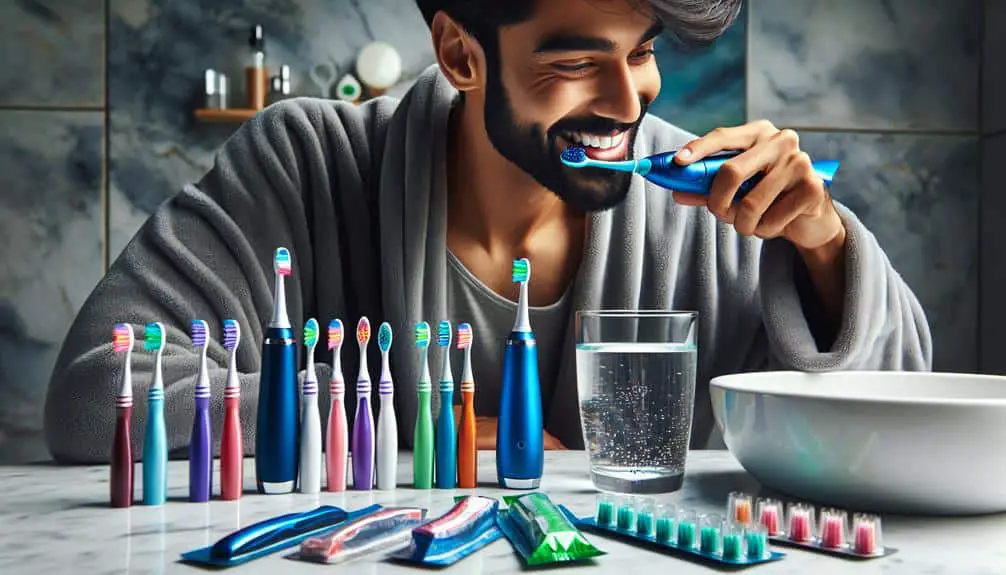Regular teeth whitening is important for your bright smile because it boosts confidence, enhances your appearance, and improves oral health. Whitening helps prevent plaque buildup, maintains good oral hygiene, and removes bacteria-harboring stains. It also encourages better oral care habits and contributes to preventing dental issues in the long run. Professional whitening offers faster results, while at-home options provide convenience and cost-effectiveness. Keep up with regular teeth whitening to enjoy these benefits and more.
Key Points
- Enhances aesthetic appearance and boosts confidence.
- Reduces plaque buildup and maintains good oral hygiene.
- Boosts self-confidence and influences social interactions.
- Prevents discoloration and future dental issues.
- Offers professional strength results and long-term oral health benefits.
Benefits of Regular Teeth Whitening
Regular teeth whitening offers more than just aesthetic benefits; it can also improve your overall oral health. When you invest in regular teeth whitening treatments, you not only achieve an improved aesthetic appearance but also enhance your smile's overall radiance. Your teeth will have a brighter appearance, giving you a more youthful glow that can boost your confidence and self-esteem.
A whiter smile can make you appear more attractive and approachable, positively impacting your social and professional interactions. It can also motivate you to maintain good oral hygiene practices, such as regular brushing and flossing, to preserve the results of the whitening treatment.
Impact on Dental Health
Maintaining the brightness of your smile through regular teeth whitening treatments can have a significant impact on your dental health. This is because it reduces the risk of plaque buildup and gum disease. The prevention of plaque buildup is vital as it's a sticky film of bacteria that can lead to tooth decay and gum disease if not properly managed. Teeth whitening helps in the maintenance of good oral hygiene by removing stains and discoloration that can harbor harmful bacteria. By keeping your teeth clean and free of plaque, you're actively contributing to the prevention of dental issues.
Furthermore, maintaining a bright smile through teeth whitening procedures encourages better oral care habits. People who invest in the appearance of their teeth are more likely to adhere to regular brushing, flossing, and dental check-ups, leading to overall improved dental health. By prioritizing the maintenance of a white smile, you aren't only enhancing your aesthetics but also taking proactive steps towards better oral hygiene and preventing potential dental problems.
Boosting Self-Confidence
Enhancing the shade of your teeth through whitening treatments can greatly boost your self-confidence and overall appearance. The psychological effects of having a brighter smile are profound. Research indicates that individuals with whiter teeth are perceived as more attractive, successful, and trustworthy. When you feel good about your smile, you naturally exude confidence in social and professional interactions.
Improved appearance resulting from teeth whitening can have a significant impact on how you perceive yourself and how others perceive you. Studies have shown that a bright smile can enhance your self-esteem and positively influence various aspects of your life. Feeling confident in your smile can lead to increased assertiveness and a more positive self-image.
Investing in teeth whitening not only enhances your physical appearance but also contributes to a more confident version of yourself. By taking care of your teeth and improving their shade, you're investing in your overall well-being and self-assurance.
Long-Term Oral Hygiene
Improving the shade of your teeth through whitening treatments can positively impact your long-term oral hygiene by encouraging consistent dental care practices. Preventing discoloration is an essential aspect of maintaining oral health. When you invest in regular teeth whitening, you aren't only enhancing the aesthetics of your smile but also taking steps to prevent future discoloration. This process often involves professional cleaning, which helps remove built-up stains and plaque that can contribute to oral health issues if left unchecked.
Maintaining brightness through teeth whitening treatments can also serve as a motivation to keep up with your oral hygiene routine. People who undergo whitening procedures are more likely to brush and floss regularly to preserve the results. This increased focus on oral care can lead to improved overall oral hygiene and potentially reduce the risk of dental problems such as cavities and gum disease. By prioritizing teeth whitening, you aren't just achieving a brighter smile but also setting the foundation for long-term oral health.
Professional Vs. At-Home Options
When considering teeth whitening options, it's important to weigh the differences between professional and at-home treatments. Professional care typically involves visiting a dentist or a specialized teeth-whitening clinic. These professionals use stronger whitening agents that can provide quicker and more noticeable results compared to at-home DIY solutions. Additionally, professional treatments are often tailored to the individual's specific needs and can address more severe discoloration effectively.
On the other hand, at-home options offer convenience and cost-effectiveness. DIY solutions like whitening toothpaste, strips, and trays are readily available over the counter. While these products may take longer to show results and may not be as potent as professional treatments, they can still help maintain a brighter smile when used consistently.
Ultimately, the choice between professional and at-home teeth whitening depends on factors such as desired results, budget, and convenience. Consulting with a dentist can help determine the best approach for achieving a whiter smile that suits your needs and preferences.
Frequently Asked Questions
Can Teeth Whitening Treatments Cause Tooth Sensitivity or Damage to Enamel?
Tooth whitening treatments can sometimes lead to sensitivity or enamel damage. However, preventive measures like using desensitizing toothpaste and ensuring proper application can help protect enamel. Consult your dentist for personalized advice and recommendations.
Are There Any Age Restrictions or Health Conditions That May Prevent Someone From Getting Their Teeth Whitened?
Feeling uncertain about age restrictions or health conditions for teeth whitening? Safety concerns vary based on individual factors. Consult a professional for guidance. Treatment options can be tailored to meet your specific needs effectively.
How Often Should Someone Get Their Teeth Whitened to Maintain Results?
To maintain teeth whitening results, consider professional whitening every 6-12 months. While at-home methods offer convenience, professional treatments may be more effective long-term despite higher initial costs. Consult your dentist for personalized recommendations.
Are There Any Natural Remedies or DIY Methods for Whitening Teeth That Are Safe and Effective?
Want to brighten your smile naturally? Natural remedies like baking soda and hydrogen peroxide can be effective DIY methods for teeth whitening. While safe when used correctly, consult a dentist for significance and safety.
Can Certain Lifestyle Habits, Like Smoking or Consuming Certain Foods and Drinks, Affect the Results of Teeth Whitening Treatments?
To maintain peak teeth whitening results, consider how lifestyle habits impact your smile. Smoking and certain foods or drinks can diminish the effectiveness of treatments. Stay mindful of these influences to guarantee a brighter, whiter smile.



